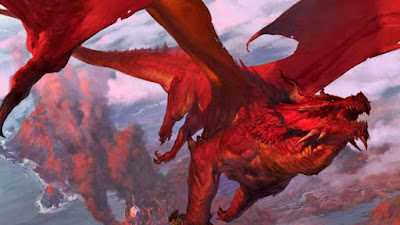There's a limitless number of ideas marching around our planet about Dungeons & Dragons. Articles about how to run the game. Videos about crafting compelling nonplayer characters. Entire books dedicated to improving as many people as possible in the craft. Forums of hundreds of thousands detailing ten thousand games and the worlds they're in. Limitless might be too little of a word. Perhaps the content out there is truly unlimited and unfathomable.
 |
| A red dragon drawn by Tyler Jacobson flies from a town of judgy Dungeon Masters. |
With all of this at our fingertips, we might be pressured into perfecting our craft and running the absolute best D&D game.
We witness jaw-dropping battle maps built with Dwarven Forge assets and exquisite D&D miniatures. We hear great DMs like Matthew Mercer pull out a plethora of voices for a wide cast of characters. We watch dozens of videos explaining HERE'S THE BEST WAY TO PLAY D&D and all of them seem to conflict with each other and at times our own view of the game. It's a lot.
For those of us active in the online D&D-space, the pressure might build to a breaking point.
Our game might not boast all the bells and whistles viewed at other tables, all the shocking twists and well-crafted pinnacle encounters. It might not create a story remembered for decades after it finishes, passed down to sons & daughters, D&D-fanatics or not. It might not even last more than a few sessions, slipping from our schedules as other duties and hobbies overtake us. But we shouldn't let any of these points break us.
As long as the D&D games we run are fun for us and the other people at the table, virtual or physical, we shouldn't regret running them.
 |
| Multiple beholders obliterate a dragon who claims his way of running D&D is best. |
Don't regret running a basic D&D game. All we need are a few players, a space to play, some dice, tools to track the game, and a dash of inspiration. That's all. That's basic D&D, the minimum required to have some fun. And if we're having fun, that's all that matters. We should feel empowered to improve or change our game by the tips, tricks, and other tidbits of knowledge and spectacle shared across our wide world, we shouldn't let it hinder us or alter the way we think about our game. It's not lesser because we don't do all these different things, it's good because it's fun to us and the players.
Remember: D&D is a hobby that can last a lifetime. During that lifetime, there's plenty of time to steadily build our game, improve our methods, and change the way we play.
So, as we peruse articles like mine, the great works of Chris Perkins, the content-dense videos of Sly Flourish, the many spectacular ideas and visions found across all of the D&D subreddits, or catch a glimpse of the Critical Role table, we must keep in mind: Our games, no matter how minimally built or played, are good because they're fun for us and the players. Don't regret running a game built on the essentials and the ultimate essential factor: fun.
We have a lifetime to change our game up or keep it the same; whatever we and our players prefer.
Related Articles
- Learn From Epic Failure and Slog
- Dungeons & Dragons: A Lifetime for Improvement
- See How Far You've Come, Explore Old D&D Notes!
Discover More D&D Advice from RJD20
RJD20 uses affiliate links to the DMs Guild and Amazon. Thanks for your support!
No comments:
Post a Comment